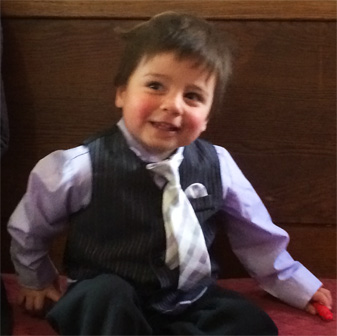A couple of weeks ago, I asked my therapist, “Will I ever get to the bottom of this pile of bad feelings, or is this my life?” I was going through another patch of nightmares and becoming frustrated. No new information was coming up; the incidents were way in the past, by now more thoroughly re-processed than Cheez Whiz.
I’d been operating with this image of my psyche as an overstuffed closet. As long as I was awake, I could keep holding the door shut, but every time I fell asleep, some junk would fall out. Eventually, though, wouldn’t I run out of old junk? Then I would have reclaimed my entire closet, to fill only with things from my fabulous new life!
But my therapist was like, “Nah, it doesn’t work that way.”
Some feelings will shift, she said; some memories will lose their charge, others will remain very painful but arise less often. However, PTSD is for many people a lifelong chronic condition. As Buddha said about suffering in general, the biggest thing I can do to ease my burden is to stop resisting it. Stop being surprised and frightened when it flares up again. Stop being angry at myself for not being “done” healing. There is no “done”.
I was thrilled!
It was a relief to stop blaming myself for my scars, and the survivor-introvert-Highly Sensitive Person in me loves predictability. But also, I was overjoyed that now I had a name for the liberal Christian indifference toward survivors, which I’d been awkwardly calling “normalcy privilege”.
Ableism.
On one level, the liberal church does a lot to ensure access for people with disabilities. Our parish, for instance, is one of the few congregations in the area with a sign language interpreter every Sunday. We’re undertaking a heroic capital campaign to add an elevator. The priest adapts the liturgy to say, “Those who are able, please stand”.
But as is usually the case in liberalism, the model is inclusion for the disabled, rather than disability as a standpoint for liberation theology. The latter, more radical posture would mean that the able-bodied/neurotypical people in charge would de-center their own experience, and invite the disabled to share what Christianity looks like in our lives.
For instance, where do we situate ourselves in the many gospel stories about Jesus healing mental and physical illnesses? (I’m treating the demon-possession stories as examples of mental illness because those were the manifested symptoms, but I don’t mean to imply the demons weren’t also real.) Liberal sermons about these stories are more likely to assume a non-disabled subject position for their audience. “We” are encouraged to emulate Jesus by healing others, or to overcome “our” prejudices about sharing fellowship with mentally challenged people. I will say that our church has made some progress beyond this narrow paradigm, through sermons about personal and family struggles with addiction, such as this beautiful meditation from lay preacher Vicki Ix at God Is Always More.
When we only talk about disability in the context of healing, that’s problematic in its own right. Of course those who feel afflicted want healing. Of course those who empathize with others’ affliction want to offer them something to hope for. But in reality, some conditions are incurable. While I don’t rule out miraculous divine cures, I feel that most of our energy should be directed toward overcoming obstacles to the disabled person’s functioning as an equal in our church, just as she is.
The pressure to manifest a spiritual happy ending can actually impair recovery. When there is healing, particularly for psychological conditions, it may not even be recognized by the non-afflicted, because they’ve been steeped in the ableist cultural narrative of triumphing over the disability rather than embracing it. For example, survivors who claim they’ve forgiven the abuser and released all angry feelings get more credit for being “healed” than survivors who have gone deep enough into recovery to feel righteous anger and finally love themselves.
Alongside the theology of healing, we need to develop theology that honors the disability as an genuine alternative way of being in the world. This is how some hearing-impaired people feel about Deaf culture. The autism community also includes many who want to celebrate their neurodiversity rather than eliminate it. In my recent post about survivors’ spiritual gifts, I suggested that the church could learn something unique from our trauma history and how we adapted to it.
The foregoing discussion owes much to Kelby Carlson’s essay “Crooked Healing“, which I found when Googling disability theology. Carlson, a music student and evangelical Christian, suggests that disability can be a vocation and a symbol of the universal human vulnerability that calls for God’s grace. Some quotes follow, but please read the whole thing here.
…It might seem strange to some that, as a lifelong person of faith, I would find the other’s desire for prayer to be so hard to respond to. Prayer is supposed to be an instrument of gratitude, intercession and doxology. But as a person with a disability, there is a shadow to the element of prayer cast over any interaction that directly involves my disability. As someone with a chronic (and, barring incredible medical advances, permanent) disability, this is a perennial problem I must navigate as a member of the church and aspiring theologian. On the face of it, this request for prayer seems harmless, even beneficent. But it is nearly always accompanied by an explanation: “I want you to be healed.”
But what is wrong with this? Doesn’t the Christian religion hold out hope of ultimate healing? Doesn’t God promise physical restoration to those who have faith in his righteousness? Don’t we, as people of God, long for the day “when there will be no mourning, nor death, nor crying, nor pain?” Insofar as this vision seeks to give a glimpse of a new creation, reconciled to God, where we are in full communion with each other and with Triune Being, than I can only heartily affirm such an idea. But lurking beneath such a portrait is something that is far more troubling. It is the erasure of the past, and the elimination of disability as a means of living well before God…
****
…The project of constructing a theology of disability needs to steer between two unhelpful shoals. The first shoal is a kind of non-redemptive liberation theology. Liberation theology is generally conceived of as a project to free marginalized people from oppressive theological systems. Unfortunately it tends to ontologize whatever its marginalized category is—for example, conceiving of God as ontologically “black”, “female”, or “disabled”—and thus reconstituting the relationship between God and the world in such a way that God is eternally hostile to categories outside of that ontology. This way of conceiving of theology is unhelpful because it both goes beyond Scripture in adding to God’s attributes and refusing to stand under Scripture and acknowledge God’s desire for universal reconciliation. In this way much liberation theology is fundamentally “non-redemptive” because it collapses finite reality into infinitude. This is especially unhelpful for disability because it cannot acknowledge a progressive or redemptive goal into which disability might fall.
The opposite danger is to collapse disability into a grand narrative of sin in such a way that redemption of disability becomes redemption from disability. For those suffering with chronic disabilities, this means that their continuity of identity is effectively destroyed by an anomalous resurrection. Resurrection as conceived this way is not a renewal and transfiguration of an old creation, but an erasing of the old to make way for something completely new. This leaves those with lifelong disabilities left with no theological anchor by which they can live out their experience in relationship to God and the world…
****
…There are few things more potentially useful to the disabled experience than the idea of vocation. Vocation places disability in a wider spectrum of the sacred calling. It implies that disabled people and their able-bodied counterparts are on equal spiritual footing. More than that, it suggests that disabled people can be seen as conduits for God’s grace and service rather than it only images of a broken creation in need of “fixing.”
This doctrine of vocation restores the image of God to the disabled. In response to the worry that disability is evidence of sin, one can reply precisely to the contrary. While brokenness itself is evidenced of a creation longing for release from bondage, an individual’s disability is, subversively, a venue for Christ to display his glory…
The theology of the cross is a particular way of doing theology that disabled people can uniquely understand. It is the theology that acknowledges the “visible” things of God: namely the cross of Christ and visible suffering as the premier way of “seeing” God. God’s grace is manifested, paradoxically, in that which appears weak and nonsensical. In this view, one cannot blithely skip over the cross as a simple means to God’s vindication and resurrection. This results in an anemic view of suffering: something that is meant only to be patiently endured in the hope that perhaps someday things will get better. In contrast, St. Paul offers a paradigm for understanding weakness and suffering that is directly consonant with the theology of the cross [the thorn in the flesh]…
****
…The cross brings all ideas of human weakness into itself. Individually, the disabled can recognize the cross as the nexus of their relationship with Christ in his weakness, and realize that possessing a “thorn” is a means of grace in weakness rather than shame. Ecclesiologically, the disabled can be recognized as, in an important way, ikons of Christ’s redemptive suffering…
Have a blessed Good Friday, dear readers.

